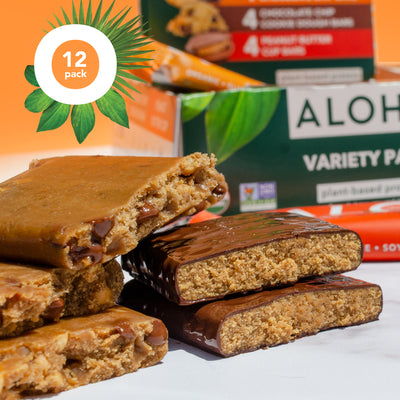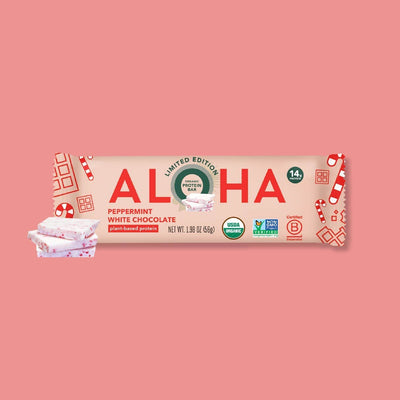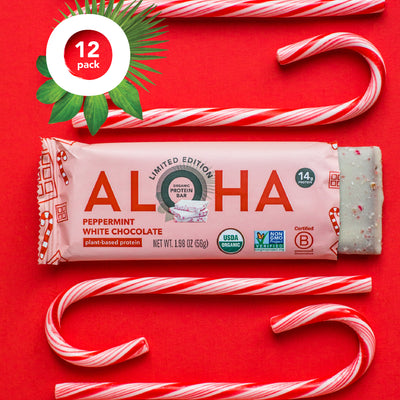Key Takeaways:
- Expiration Dates Indicate Peak Quality: The "best by" date on protein powder reflects when it’s expected to taste and perform best. It doesn't automatically mean the product is unsafe after that date.
- Signs of Spoilage Are Easy to Spot: Changes in smell, taste, color, or texture can signal that protein powder has gone bad. Always inspect the powder before each use to ensure safety.
- Packaging Plays a Key Role: Airtight, resealable packaging helps protect protein powder from air and moisture. Proper sealing after each use helps extend the product's usable life.
Is the protein powder in your pantry still as good as the day you bought it? Protein powders don’t always give clear signs when they’re past their best, making it difficult to know when it’s time to replace them.
At ALOHA, we proudly create USDA Organic, plant-based protein powders free from GMOs, gluten, soy, dairy, stevia, and sugar alcohols. Our products reflect our dedication to clean ingredients and thoughtful sourcing and offer simple, high-quality nutrition.
In this piece, we’ll explore whether protein powder expires, how to recognize if it’s no longer good, and the best ways to store it to keep it fresh and safe for use.
Does Protein Powder Expire?
Yes, protein powder does expire. Like most packaged foods, protein powders have a shelf life and are usually printed on the container as a “best by” or expiration date. This date reflects when the product is expected to maintain its best flavor, texture, and nutritional quality.
After this date, protein powder doesn’t automatically become unsafe, but its quality can begin to decline. Factors like storage conditions, moisture, heat, and exposure to air can speed up the breakdown of the ingredients, potentially affecting the taste, texture, and overall experience. While many protein powders remain usable for some time past their printed date, it's always wise to check for signs of spoilage before consuming.
Common Signs Of Spoiled Protein Powder
Protein powder may not spoil overnight, but certain changes can signal that it's no longer safe or enjoyable to consume. Paying attention to these signs can help you avoid using a product that has deteriorated in quality or safety:
- Unpleasant Smell: A fresh container of protein powder typically has a mild, inviting aroma that reflects its ingredients. When it starts to give off a sour, bitter, or musty odor, it's often a sign that the powder has broken down or been exposed to moisture. This change in smell usually indicates spoilage and should not be ignored.
- Change in Color: Protein powder should maintain a consistent, even color throughout its shelf life. If you notice any dark spots, yellowing, or uneven patches, it could be a sign of oxidation or contamination. Discoloration often points to degradation, making the powder unsafe to consume.
- Clumping or Moisture: Protein powder is designed to stay dry and powdery. If you find clumps or notice a sticky texture, moisture has likely entered the container, creating an environment where bacteria or mold can grow. Moisture is one of the most common causes of spoilage in powdered products.
- Off Taste: Taste is often one of the easiest ways to detect a problem after mixing your powder. A sour, bitter, or unusually bland flavor can signal that the ingredients have degraded or the powder has become contaminated. If the taste differs from when you first opened the package, it's safest to stop using it.
- Signs of Mold or Insects: Any visible mold growth, fuzzy spots, or signs of insect activity are immediate red flags. Protein powder showing these signs should be discarded immediately to avoid any health risks. Always check the interior of the container if you suspect something may be wrong.
How Long Does Protein Powder Last After Opening?
Once opened, protein powder is generally safe to use for several months, provided it's stored correctly. Most manufacturers recommend using the powder within 6 to 12 months of opening, even if the printed expiration date is further out. This helps maintain its flavor, texture, and overall quality.
Exposure to air, moisture, and light can gradually affect the powder’s condition. Keeping the container sealed tightly and stored in a cool, dry place helps slow down this process. While some powders may seem fine after a year, the longer they sit open, the more likely they are to develop off-flavors or changes in texture.
Always check for any signs of spoilage before using protein powder that’s been open for an extended period.
What Factors Affect Protein Powder Shelf Life?
Protein powder doesn’t spoil overnight, but several factors affect how long it stays fresh. By understanding these elements, you can help ensure your protein powder maintains its best quality for as long as possible. Here are the key factors to keep in mind:
- Type of Protein: The kind of protein used directly influences how long it stays good. Plant-based protein powders often contain fewer perishable components, making them more shelf-stable than dairy-based varieties. However, all types still require proper storage to preserve their freshness.
- Ingredients: Every added ingredient contributes to the powder’s overall stability. Simpler formulas with minimal additives may last longer because there are fewer components that can degrade over time. Flavors, natural sweeteners, or extracts may shorten the shelf life slightly if not stored properly.
- Packaging: Good packaging acts as the first line of defense against spoilage. Airtight, resealable containers help block out air and moisture, two of the biggest threats to protein powder stability. Quality packaging also helps protect the powder from exposure to light, which can slowly alter its quality.
- Storage Conditions: Where you store your protein powder can either preserve or shorten its lifespan. Exposure to heat, humidity, or sunlight can speed up the breakdown of ingredients and lead to spoilage. A cool, dry pantry or cupboard offers the best environment for maintaining freshness.
- Exposure to Moisture: Protein powder naturally absorbs moisture from the surrounding air if not sealed tightly. Once moisture gets inside, it can cause clumping and create the perfect conditions for mold growth. Always reseal the container after each use to protect the powder from humidity.
Tips To Extend The Shelf Life Of Your Protein Powder
While protein powder won’t last forever, simple habits can help you get the most out of every container. Proper care can slow down spoilage and maintain the powder’s taste, texture, and quality for as long as possible. Here are some helpful tips to follow:
Store In A Cool, Dry Place
Temperature and humidity significantly determine how quickly protein powder breaks down and loses its effectiveness. It's best to store the container in a pantry or cupboard that stays cool and dry, far from heat sources like ovens, stovetops, or direct sunlight. Humid locations, such as near the kitchen sink or inside a bathroom, should be avoided as they can introduce moisture that leads to clumping or spoilage.
Keep The Container Sealed Tight
When protein powder is exposed to air, moisture, and oxygen, it can seep in, causing it to clump and eventually spoil. Always make sure the lid is tightly sealed immediately after scooping to prevent unnecessary air exposure. If the original packaging doesn’t provide a reliable seal, consider transferring the powder to a high-quality airtight container for better protection.
Avoid Using Wet Or Dirty Scoops
Introducing any moisture into the protein powder can create an environment where mold and bacteria can thrive, significantly reducing its shelf life. Always ensure that your scoop is completely dry and clean before dipping it into the container. Even small droplets of water on the scoop can trigger spoilage over time.
Limit Opening Frequency
Each time you open the container, you allow moisture and air to enter, which can degrade the powder, especially in humid climates. Try to minimize how often you open the container and avoid keeping it open longer than necessary. This simple habit helps maintain the powder’s freshness and quality for a longer period.
Check Expiration Dates Before Buying
Choosing protein powder with a longer shelf life gives you more flexibility in how quickly you need to use it. Always check the expiration or “best by” date on the packaging before purchasing to ensure you’re getting the freshest product possible. Buying products closer to their manufacturing date ensures optimal taste, texture, and nutritional value.
Final Thoughts
Like any product we rely on for daily nutrition, protein powder deserves careful attention to its freshness and quality. While expiration dates provide a helpful guideline, your senses—smell, taste, and sight—are often the best tools for determining if your powder is still good. With the right care, protein powder can remain a reliable part of your wellness routine, supporting your health goals without compromise.
Choosing products with clean, simple ingredients—like ALOHA’s plant-based protein powders—offers added peace of mind. You'll know you're fueling your body with thoughtfully crafted nutrition that’s as intentional as your healthy lifestyle.
Read also:
- How To Make Protein Shakes: Simple Recipes And Tips
- Protein Shake For Breakfast: Quick And Nutritious Start
- Top Benefits Of Vegan Protein Powder
Frequently Asked Questions About Does Protein Powder Expire
Can expired protein powder still mix well?
Expired protein powder might not mix as smoothly as it once did. Over time, the texture can become gritty or form clumps in liquids, making shakes or recipes less enjoyable.
Does the flavor of protein powder change after expiration?
Yes, expired protein powder can lose its original flavor and may even develop a bitter or stale taste. Natural flavors can break down or oxidize over time. This change in taste is one of the first signs that it may no longer be ideal to consume.
Does protein powder smell different when expired?
Expired protein powder often develops a sour, musty, or off odor. This indicates that it may have been exposed to moisture or oxygen. If the smell is noticeably different from when you first opened it, it's best not to use it.
Can unopened protein powder expire?
Yes, even unopened protein powder has a shelf life. Although the sealed packaging helps preserve freshness longer, it still gradually degrades. Always check the expiration date before using an unopened container.
Does protein powder expire faster if kept in a gym bag?
Keeping protein powder in a gym bag exposes it to heat, humidity, and constant temperature changes. Even if the container is sealed, these conditions can speed up spoilage. It's always better to store it in a cool, dry place.
Can freezing protein powder extend its shelf life?
Freezing protein powder is not typically recommended. Moisture can build up during the freezing and thawing process, increasing the risk of clumping or spoilage. Proper pantry storage is usually more effective for long-term preservation.
Do flavored protein powders expire faster than unflavored?
Flavored protein powders may have a slightly shorter shelf life because of added natural extracts or flavoring agents. These ingredients can break down over time, affecting taste and quality. Unflavored varieties may remain stable a bit longer under proper storage.
Does organic protein powder expire differently from non-organic?
Organic and non-organic protein powders have similar expiration dates and storage needs. The difference in ingredients doesn’t significantly affect how quickly they expire. Proper storage is the key factor for both types.
Can protein powder absorb odors from the environment?
Yes, protein powder can absorb strong odors if not sealed tightly. This can alter the taste and smell of the powder over time. Keeping the container sealed helps prevent this issue.
Is it safe to cook or bake with expired protein powder?
Using expired protein powder in cooking or baking doesn’t remove the risks of spoilage. If the powder shows signs of degradation, it's best not to consume it, even in cooked recipes. Always inspect the powder's condition before using it.
Sources:
1. Fyfe, K. N., Kravchuk, O., Le, T., Deeth, H. C., Nguyen, A. V., & Bhandari, B. (2011). Storage induced changes to high protein powders: influence on surface properties and solubility. Journal of the Science of Food and Agriculture, 91(14), 2566–2575. https://doi.org/10.1002/jsfa.4461
2. Andrade, M. (2024, March 22). What Are The Long Term Effects Of Protein Shakes: A Comprehensive Guide - Wallpaperkerenhd.com. Wallpaperkerenhd.com. https://wallpaperkerenhd.com/interesting/what-are-the-long-term-effects-of-protein-shakes/
3. Berue, S. (2012). Vegan Protein Powder Supplements of High Biological Value. Journal of Renal Nutrition, 22(4), e39–e41. https://doi.org/10.1053/j.jrn.2012.03.005
ALOHA's products are not intended to treat, diagnose, mitigate, prevent, or cure disease. ALOHA's products should not replace prescribed medications or the variety of foods important to a healthful diet.
Do not self-diagnose any health condition. Work with your healthcare provider to determine how best to achieve optimal health.












